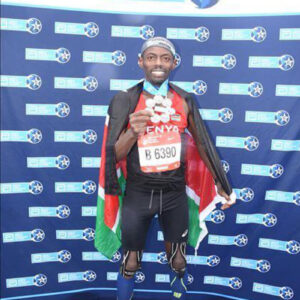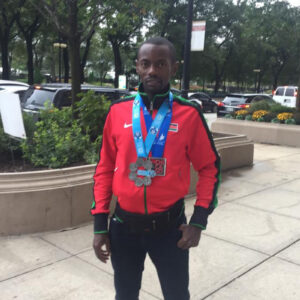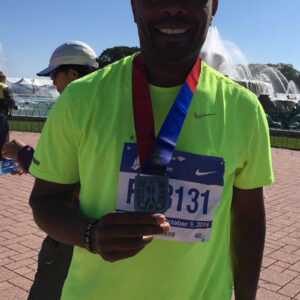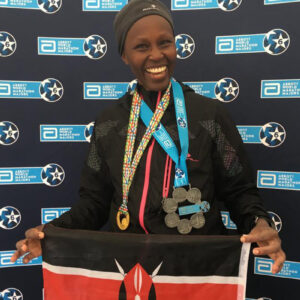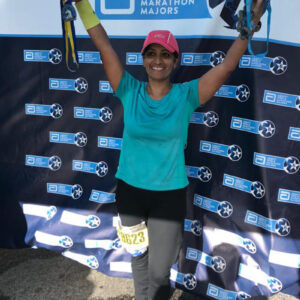When David Thuo crossed the finish line at this year’s Tokyo Marathon in March, he became the latest Kenyan to join an exclusive club of the Abbott World Marathon Majors (AWMM) six-star finishers who are also referred to as ‘The Generals’.
Thuo joined a growing list of Kenyan recreational/leisure runners who are now six-star Generals; James Waliaula, Felicita Kagwanja, Edward Mungai, Jackson Ndegwa, Caroline Ongeri, Avani Shah, Judy Nyaruai Muhoro and Rebecca Mbithi. Out of the current list of 12 Kenyans on the six-star Finisher Hall of Fame, only two are Elite runners; Edna Kiplagat and Emmanuel Mutai.
The Abbott World Marathon Majors is a series consisting of six of the largest and most renowned marathons in the world namely the Tokyo Marathon, Boston Marathon, TCS London Marathon, BMW BERLIN-MARATHON, Bank of America Chicago Marathon and TCS New York City Marathon.
In 2015, James Waliaula went down in history as the first Kenyan runner to complete all six races in the World Marathon Majors Series. So how did Kenyan recreational runners come to dominate the Abbot Hall of Fame?
I caught up with Waliaula together with other ‘Generals’ to find out everything there is to know about the AbbottWMM, how long they have been running, what set them on this path and most importantly, what it takes to qualify, prepare and run these moonshot races.
Where does a recreational runner begin in becoming a Six-star finisher?
The need to shed weight is what set Waliaula, Ndegwa, Mungai Felicita and Avani on the running path. However, over 20 years down the line for some, running has become more than just a way to keep their weight in check. It is now a hobby, a lifestyle and a way to explore the world.
Their motivations to become 6-star finishers range from sports tourism to medal hunting.
Back in 2015 when I ran my first full marathon, I felt the urge to set sight on a journey that will push me to train harder and become fitter as I aged. I figured that since marathon running requires great commitment to training the World Marathon Majors would be the best goal to keep me focused. Ndegwa tells me
His first major marathon in the series was the Berlin Marathon in 2016.
For Felicita who has been running for 20 years now, it didn’t take long to learn about the common goals pursued by recreational runners, The AbbottWMM was the Mecca.
The Abbot majors and the much sought-after six-star medal featured prominently. In any case, I realised that running in lower altitudes would improve my running statistics. She tells me
For Mungai who has been running for 10 years, pursuing the coveted marathon majors went beyond the need to challenge himself and some adventure.
It (the AbbottWMM) also played a big role for me as I used the opportunity to raise funds to make a difference for others. It was also about the status that the 6 majors come with.
Avani is in her 14th year of running. For her, it was the bling bling that earned its place on your neck declaring you the king/queen of major marathons.
After completing London Marathon in 2017, and getting my finishers medal I met a runner who had 2 medals – I was curious why he had 2 medals. When I asked him he told me about the majors. the coveted medal was only released in 2016. This is when I decided I wanted this big bling bling and encourage many other slow runners like myself to pursue full marathons even if not the majors.
How does one qualify and register for such races?
Be strategic and plan. That is that message that each of the Generals has for you if you are thinking about checking all six marathons off your bucket list.
Although the journey to each marathon is unique, each of the World Marathon Majors requires you to have attained a certain qualifying time from a recognised race even before registering.
The journey to each marathon was unique- some were through ballots, a couple through charity and at least one through a travel and tour agency. Mungai tells me
Registration can be done either through a random lottery where are required to race with a charity partner and reach a fundraising minimum. Alternatively, you can use a sports tour company.
Like many, Avani ran London, Berlin and Tokyo for charity. Chicago and New York via ballot entry, and for Boston, used a tour company.
I met the required qualifying time for each of the majors through the attained finishing time from previous races (this is called good for age entry where runners are ranked by gender and age) except Tokyo and London. Tokyo qualifying time is so high (semi-elite standards) that only very fast runners can attain it. About London, the Marathon does not allow non-UK residents entry through time qualification. Felicita tells me.
What was your first marathon major and what are some of the tough learnings?
For Waliaula, Carol, Mungai and Felicita, their first was Chicago.
For Felicita, her maiden major Marathon run was a true baptism by fire.
I learnt how important it is to plan how to deal with jet lag ahead of travel and ensure I have lots of rest before race day. I had a hard time avoiding distractions from friends and family so I realized that I should have rested better. Touring or spending too much time at the expo is also ill-advised. I tried making use of the marathon pacers only to realise I run better at my own pace. I learned to minimize the distance covered by keeping to the measured track (usually marked).
For Thuo, as he told The Daily Nation, his six-star journey began in 2017 with the London & the New York City Marathons.
Which was the hardest race to get into?
The Boston Marathon it seems is the hardest to enter and run. Partly due to its prestigious status in existence for over 100 years, the race only considers time-based qualifications thus a runner has to qualify with a specific time according to their age and gender. Ndegwa tells me a lot of runners get stuck in their six-star pursuit when it gets to Boston.
There are a few charity-based chances but they require you to raise over Ksh. 1 million.
However, for Waliaula whose world marathon majors bug bit back in 2013, his first was the hardest, the Chicago marathon.
The sold-out event registration website crashed down shortly after about 30 minutes of opening and the exercise had to be suspended with only 15,000 entries remaining to reach the cap of 45,000 runners at the time. Those who were not lucky by then had a second chance through a lottery. I was among the lucky 15,000 runners.
For Felicita, qualifying for the London Marathon felt like chasing the wind. She almost gave up till she changed tactics.
London was the most difficult because I could not qualify through time. The lottery attracts so many applicants that the chances of landing a lottery slot are almost non-existent. I kept balloting each year with no success up to this day. The only option was to run through a charity and the minimum funds to be raised are extremely high (more than 2000 UK pounds currently). This explains why London was my last major.
Mungai, Avani, Ndegwa and Carol all had no choice but to use a tour and travel company to secure their place at the Boston Marathon.
What goes into planning for such races?
The major races are expensive, thus proper planning financially is key.
Because one run qualifies you for the other, you have to know which one to start with and which one will be last. It also comes with a great commitment to training and with our busy schedules, one must find the time to train. Ndegwa explains
Raising the required funds, travel visas, accommodation and getting the right travel itinerary. It is also important to carefully plan for all activities in advance to get enough rest and of course value for money.
Firstly is the Visas from home – husband, as well as planning my children’s school and all other activities. One has to organise flight, accommodation, race number pickups, and check in the start and finish sometimes at different points. A lot of planning and time is involved. Avani tells me
Which was the hardest race to run and why?
Despite being the world’s oldest road race and arguably the most prestigious marathon, for many Kenyan six-star finishers, Boston remains their Achilles’ heel.
The Boston Marathon (2018) was the toughest of all the six and it remains the toughest run I have ever participated in. The weather was horrible before, during and after. It was cold (snowed the previous day), and rained very heavily with very strong winds.
The wind factor dropped the temperature even lower. It only got worse as the race progressed. I tried to avoid the pools of ice-cold water on the roads but l quickly accepted this was a “swim” not a run. At some point, my toes and fingers went numb. I suffered hypothermia despite wearing a very heavy winter jacket and a Marvin hat (among other things) throughout. I sat shaking for half an hour inside the left luggage tent at the end of the run. To this day I still find it hard to believe that I completed that race. Most elite runners dropped out. The race winners in both gender categories that year were neither Kenyan nor African. Felicita vividly remembers her experience.
What do they give you for finishing all 6 major races?
The 6 Star World Marathon Majors Finisher medal, a certificate and an entry into the hall of fame have become the hallmarks of the Generals.
As Carol tells me, what the AbbottWMM gave her, is more than just the tangible;
I am an amateur runner, and not fast at all, and becoming the first amateur Kenyan female to get the 6 stars at the age of 50 has motivated me to keep going despite injuries and the inevitable slowing down as we get older.
What impact has this achievement had on your running?
It takes an enviable daredevil attitude they tell me. Once the AbbottWMM is done with you, you become a different person.
Apart from greatly improving their health, their accomplishments have inspired hundreds of Kenyans to become runners and challenged the myth that you have to be elite or fast to enter a marathon
Because of what I have done, many other slow runners dare to go and accomplish the 6-star dream too. I want more runners to know that they too can get their 6 stars despite their speed. Avani says
Mungai and Avani have impacted many lives and have contributed significantly to the charities that they ran for. As Mungai tells me, the funds he raised through charity have helped educate close to 200 children.
Have an inspiring story you’d like to share, email us; stories(at)KenyanPoet(dot)com
